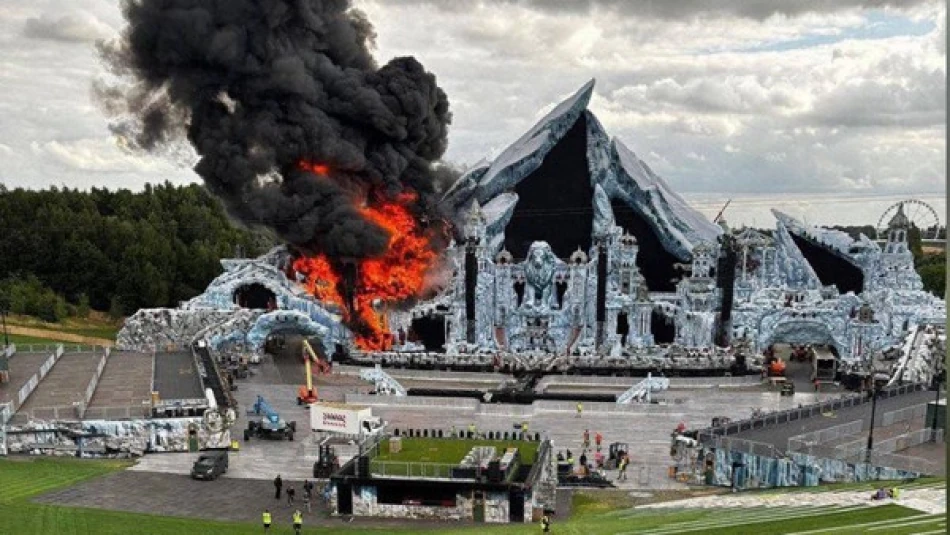
Devastating Fire Destroys 'Tomorrowland' Festival Stage in Belgium, Organizers Vow to Rebuild
Tomorrowland's Main Stage Destroyed by Fire Hours Before Festival Opens
Belgium's iconic Tomorrowland electronic music festival faces its biggest logistical challenge in years after a devastating fire completely destroyed the main stage just hours before the event's scheduled opening. Despite the setback, organizers confirmed the festival will proceed as planned, with 100,000 attendees expected over two consecutive weekends starting Friday.
Fire Devastates Central Performance Venue
The blaze erupted Wednesday evening at the festival site in Boom, near Antwerp, completely destroying the main stage—the larger of two primary performance venues at the world-renowned electronic music gathering. Nearly 100 firefighters were deployed to contain the flames, though no injuries were reported.
The timing couldn't have been worse. The main stage, built in an expansive and enchanting setting, was set to host major acts including David Guetta, Lost Frequencies, Armin van Buuren, and Charlotte de Witte during the first weekend running July 18-20.
Festival Organizers Scramble for Solutions
In a press conference following the incident, Tomorrowland organizers demonstrated the crisis management skills that have made the festival a global benchmark for large-scale events. They confirmed that "Dreamville," the festival's camping site, will open as scheduled Thursday, and emphasized they are "looking for solutions" to ensure the first weekend proceeds smoothly.
The festival operates across two stages—the now-destroyed main stage and the "Freedom Stage." With half their primary infrastructure gone, organizers face the monumental task of redistributing performances and managing crowd flow for what is essentially a small city's worth of attendees.
A Test of Event Management Excellence
Tomorrowland's response to this crisis will likely become a case study in event management resilience. The festival has built its reputation not just on spectacular production values, but on seamless execution that attracts electronic music fans from across the globe to a small Belgian town.
The festival's ability to adapt mirrors similar challenges faced by major events worldwide. When Coachella dealt with technical failures in previous years, or when European festivals navigated COVID-19 restrictions, successful adaptation often separated industry leaders from competitors.
Economic and Cultural Stakes
Beyond the immediate logistical challenge, the incident highlights the massive economic machinery behind modern music festivals. Tomorrowland generates significant revenue for the Belgian economy, with international visitors contributing millions in tourism spending. The festival's smooth operation also maintains Belgium's position as a key player in the global electronic music scene.
For the 100,000 attendees—many of whom have traveled internationally and made substantial financial commitments—the organizers' ability to deliver a quality experience despite the setback will determine whether this becomes a memorable story of resilience or a cautionary tale about event planning vulnerabilities.
The electronic music industry will be watching closely as Tomorrowland attempts to prove that even when faced with infrastructure destruction, world-class event management can adapt and deliver.
Most Viewed News

 Layla Al Mansoori
Layla Al Mansoori






